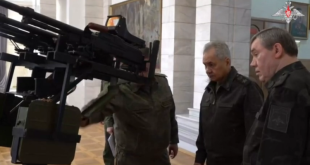
Greece’s largest opposition party on Tuesday protested the announcement by German Chancellor Olaf Scholz that Athens would be sending Soviet-era armored vehicles to Ukraine.
The “ring swap,” in which Germany would send newer vehicles to Greece in exchange, enables Berlin to keep its distance from the conflict in Ukraine.
“We consider it inconceivable that the Greek people would have heard this news from the German chancellor at a time when the Greek prime minister did not speak about it at his press conference,” the Syriza-Progressive Alliance said in a statement.
Addressing reporters on Tuesday, after a European Council meeting in Brussels, Scholz revealed the “Ringtausch” deal with Athens, and said he was speaking with Polish Prime Minister Mateusz Morawiecki to make a similar arrangement with Warsaw.
Greece is reportedly hoping to get second-hand Marder 1A3 infantry fighting vehicles (IVF) in exchange for sending Ukraine some of its aging BMP-1-Ost IFVs. Germany’s Rheinmetall said last month it had around 200 refurbished Marders ready to go.
Athens acquired 500 or so BMP-1-Ost vehicles from Berlin back in 1994, which were refurbished from the old East German arsenal. This particular design is the very first generation of infantry fighting vehicles, and the Greeks have reportedly had trouble keeping them operational due to a lack of spare parts and ammunition. About 100 were sent to the US-backed Iraqi armed forces after the 2003 invasion, several were converted to ZU-23-2 anti-aircraft platforms, while others were retired and even used for target practice.

As for Poland, President Andrzej Duda accused Germany last week of breaking a pledge to send Warsaw Leopard 2 tanks as replacements for some 200 of its Soviet-era T-72s dispatched to Ukraine. Berlin responded that it was “perplexed” by the charges, as Germany never promised the new Leopard 2A27s, and in any case didn’t have any to send as producing them takes time.
Scholz has repeatedly told German media that he supports Kiev, but does not want to see Germany and NATO drawn into the conflict with Russia directly. In April, he said Berlin could not send any more of its own weapons because the Bundesweahr stocks were depleted, but that Germany would pay its weapons industry to send refurbished equipment to Ukraine. The very first shipment of German heavy vehicles – 15 of the retired Gepard anti-aircraft systems – is due to reach Ukraine in July.
According to the Russian Defense Ministry, Ukraine has lost more than 3,300 tanks and other armored vehicles since February 24.
Russia attacked the neighboring state in late February, following Ukraine’s failure to implement the terms of the Minsk agreements, first signed in 2014, and Moscow’s eventual recognition of the Donbass republics of Donetsk and Lugansk. The German- and French-brokered protocols were designed to give the breakaway regions special status within the Ukrainian state.
The Kremlin has since demanded that Ukraine officially declare itself a neutral country that will never join the US-led NATO military bloc. Kiev insists the Russian offensive was completely unprovoked and has denied claims it was planning to retake the two republics by force.
© 2022, paradox. All rights reserved.





